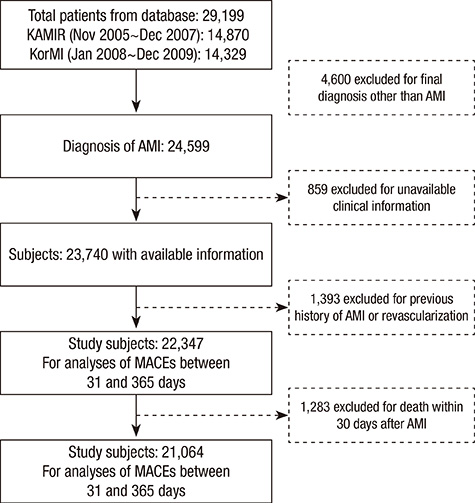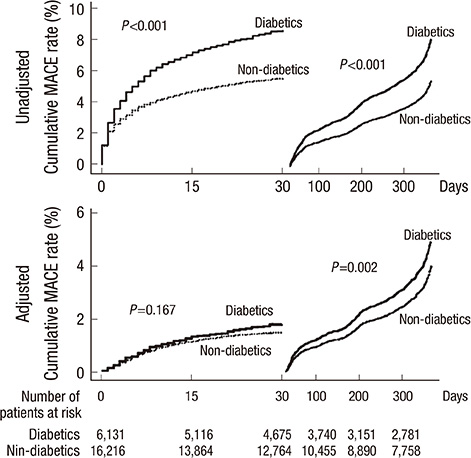J Korean Med Sci.
2013 Dec;28(12):1749-1755. 10.3346/jkms.2013.28.12.1749.
Differential Prognostic Impacts of Diabetes over Time Course after Acute Myocardial Infarction
- Affiliations
-
- 1Department of Internal Medicine, Cardiovascular Center, Seoul National University Boramae Medical Center, Seoul, Korea.
- 2Department of Internal Medicine, Cardiovascular Center, Seoul National University Hospital, Seoul, Korea.
- 3Department of Internal Medicine, Cardiovascular Center, Seoul National University Bundang Hospital, Seongnam, Korea. djchoi@snu.ac.kr
- 4Department of Internal Medicine, Kyungpook National University Hospital, Daegu, Korea.
- 5Department of Internal Medicine, Chungbuk National University Hospital, Cheongju, Korea.
- 6Department of Internal Medicine, Yeungnam University Hospital, Daegu, Korea.
- 7Department of Internal Medicine, Chonnam National University Hospital, Gwangju, Korea.
- KMID: 1779415
- DOI: http://doi.org/10.3346/jkms.2013.28.12.1749
Abstract
- This study was performed to evaluate the effects of diabetes on short- and mid-term clinical outcomes in patients with acute myocardial infarction (AMI). Between October 2005 and December 2009, a total of 22,347 patients with AMI from a nationwide registry was analyzed. At the time point of the day 30 after AMI onset, landmark analyses were performed for the development of major adverse cardiovascular events (MACEs), including death, re-infarction and revascularization. In this cohort, 6,131 patients (27.4%) had diabetes. Short-term MACEs, which occurred within 30 days of AMI onset, were observed in 1,364 patients (6.1%). Among the 30-day survivors (n = 21,604), mid-term MACEs, which occurred between 31 and 365 days after AMI onset, were observed in 1,181 patients (5.4%). After adjustment for potential confounders, diabetes was an independent predictor of mid-term MACEs (HR, 1.25; 95% CI, 1.08-1.45; P = 0.002), but not of short-term MACEs (HR: 1.16; 95% CI: 0.93-1.44; P = 0.167). Diabetes is a poor prognostic factor for mid-term clinical outcomes but not for short-term outcomes in AMI patients. Careful monitoring and intensive care should be considered in diabetic patients, especially following the acute stage of AMI.
Keyword
MeSH Terms
-
Acute Disease
Aged
Cardiovascular Diseases/etiology
Cohort Studies
Diabetes Mellitus, Type 2/complications/*diagnosis
Diagnosis, Differential
Female
Humans
Incidence
Male
Middle Aged
Myocardial Infarction/*diagnosis/epidemiology/mortality
Prognosis
Proportional Hazards Models
Registries
Survival Analysis
Time Factors
Figure
Reference
-
1. Chun BY, Dobson AJ, Heller RF. The impact of diabetes on survival among patients with first myocardial infarction. Diabetes Care. 1997; 20:704–708.2. Franklin K, Goldberg RJ, Spencer F, Klein W, Budaj A, Brieger D, Marre M, Steg PG, Gowda N, Gore JM. Implications of diabetes in patients with acute coronary syndromes: the Global Registry of Acute Coronary Events. Arch Intern Med. 2004; 164:1457–1463.3. Barbash GI, White HD, Modan M, Van de Werf F. Significance of diabetes mellitus in patients with acute myocardial infarction receiving thrombolytic therapy: Investigators of the International Tissue Plasminogen Activator/ Streptokinase Mortality Trial. J Am Coll Cardiol. 1993; 22:707–713.4. McGuire DK, Granger CB. Diabetes and ischemic heart disease. Am Heart J. 1999; 138:S366–S375.5. Nathan DM. Long-term complications of diabetes mellitus. N Engl J Med. 1993; 328:1676–1685.6. Gu K, Cowie CC, Harris MI. Diabetes and decline in heart disease mortality in US adults. JAMA. 1999; 281:1291–1297.7. Svensson AM, Dellborg M, Abrahamsson P, Karlsson T, Herlitz J, Duval SJ, Berger AK, Luepker RV. The influence of a history of diabetes on treatment and outcome in acute myocardial infarction, during two time periods and in two different countries. Int J Cardiol. 2007; 119:319–325.8. Lee MG, Jeong MH, Ahn Y, Chae SC, Hur SH, Hong TJ, Kim YJ, Seong IW, Chae JK, Rhew JY, et al. Comparison of clinical outcomes following acute myocardial infarctions in hypertensive patients with or without diabetes. Korean Circ J. 2009; 39:243–250.9. Casella G, Savonitto S, Chiarella F, Gonzini L, Di Chiara A, Bolognese L, De Servi S, Greco C, Zonzin P, Coccolini S, et al. Clinical characteristics and outcome of diabetic patients with acute myocardial infarction: data from the BLITZ-1 study. Ital Heart J. 2005; 6:374–383.10. Koek HL, Soedamah-Muthu SS, Kardaun JW, Gevers E, de Bruin A, Reitsma JB, Bots ML, Grobbee DE. Short- and long-term mortality after acute myocardial infarction: comparison of patients with and without diabetes mellitus. Eur J Epidemiol. 2007; 22:883–888.11. McGuire DK, Newby LK, Bhapkar MV, Moliterno DJ, Hochman JS, Klein WW, Weaver WD, Pfisterer M, Corbalán R, Dellborg M, et al. Association of diabetes mellitus and glycemic control strategies with clinical outcomes after acute coronary syndromes. Am Heart J. 2004; 147:246–252.12. Richman PB, Brogan GX Jr, Nashed AH, Hollander JE, Thode HC Jr. Do diabetic patients have higher in-hospital complication rates when admitted from the emergency department for possible myocardial ischemia? Acad Emerg Med. 2000; 7:264–268.13. Kang SH, Suh JW, Yoon CH, Cho MC, Kim YJ, Chae SC, Yoon JH, Gwon HC, Han KR, Kim JH, et al. Sex differences in management and mortality of patients with ST-elevation myocardial infarction (from the Korean Acute Myocardial Infarction National Registry). Am J Cardiol. 2012; 109:787–793.14. Lee KH, Jeong MH, Ahn Y, Cho MC, Kim CJ, Kim YJ. New horizons of acute myocardial infarction: from the Korea Acute Myocardial Infarction Registry. J Korean Med Sci. 2013; 28:173–180.15. Killip T 3rd, Kimball JT. Treatment of myocardial infarction in a coronary care unit: a two year experience with 250 patients. Am J Cardiol. 1967; 20:457–464.16. Antman EM, Wiviott SD, Murphy SA, Voitk J, Hasin Y, Widimsky P, Chandna H, Macias W, McCabe CH, Braunwald E. Early and late benefits of prasugrel in patients with acute coronary syndromes undergoing percutaneous coronary intervention: a TRITON-TIMI 38 (Trial to assess improvement in therapeutic outcomes by optimizing platelet inhibition with prasugrel-thrombolysis in myocardial infarction) analysis. J Am Coll Cardiol. 2008; 51:2028–2033.17. Antman EM, Cohen M, Bernink PJ, McCabe CH, Horacek T, Papuchis G, Mautner B, Corbalan R, Radley D, Braunwald E. The TIMI risk score for unstable angina/non-ST elevation MI: a method for prognostication and therapeutic decision making. JAMA. 2000; 284:835–842.18. Donahoe SM, Stewart GC, McCabe CH, Mohanavelu S, Murphy SA, Cannon CP, Antman EM. Diabetes and mortality following acute coronary syndromes. JAMA. 2007; 298:765–775.19. Morrow DA, Antman EM, Charlesworth A, Cairns R, Murphy SA, de Lemos JA, Giugliano RP, McCabe CH, Braunwald E. TIMI risk score for ST-elevation myocardial infarction: a convenient, bedside, clinical score for risk assessment at presentation: an intravenous nPA for treatment of infarcting myocardium early II trial substudy. Circulation. 2000; 102:2031–2037.20. Hasin T, Hochadel M, Gitt AK, Behar S, Bueno H, Hasin Y. Comparison of treatment and outcome of acute coronary syndrome in patients with versus patients without diabetes mellitus. Am J Cardiol. 2009; 103:772–778.21. Michaels AD, Goldschlager N. Risk stratification after acute myocardial infarction in the reperfusion era. Prog Cardiovasc Dis. 2000; 42:273–309.22. Brieger D, Fox KA, Fitzgerald G, Eagle KA, Budaj A, Avezum A, Granger CB, Costa B, Anderson FA Jr, Steg PG. Predicting freedom from clinical events in non-ST-elevation acute coronary syndromes: the Global Registry of Acute Coronary Events. Heart. 2009; 95:888–894.23. Rasoul S, Ottervanger JP, de Boer MJ, Dambrink JH, Hoorntje JC, Marcel Gosselink AT, Zijlstra F, Suryapranata H, van't Hof AW. Predictors of 30-day and 1-year mortality after primary percutaneous coronary intervention for ST-elevation myocardial infarction. Coron Artery Dis. 2009; 20:415–421.24. Malmberg K, Yusuf S, Gerstein HC, Brown J, Zhao F, Hunt D, Piegas L, Calvin J, Keltai M, Budaj A. Impact of diabetes on long-term prognosis in patients with unstable angina and non-Q-wave myocardial infarction: results of the OASIS (Organization to assess strategies for ischemic syndromes) Registry. Circulation. 2000; 102:1014–1019.25. Norhammar A, Malmberg K, Rydén L, Tornvall P, Stenestrand U, Wallentin L. Register of Information and Knowledge about Swedish Heart Intensive Care Admission (RIKS-HIA). Under utilisation of evidence-based treatment partially explains for the unfavourable prognosis in diabetic patients with acute myocardial infarction. Eur Heart J. 2003; 24:838–844.26. Lee JH, Park HS, Chae SC, Cho Y, Yang DH, Jeong MH, Kim YJ, Kim KS, Hur SH, Seong IW, et al. Predictors of six-month major adverse cardiac events in 30-day survivors after acute myocardial infarction (from the Korea Acute Myocardial Infarction Registry). Am J Cardiol. 2009; 104:182–189.27. Mehta RH, O'neill WW, Harjai KJ, Cox DA, Brodie BR, Boura J, Grines L, Stone GW, Grines CL. Primary Angioplasty in Myocardial Infarction (PAMI) and the Controlled Abciximab and Device Investigation to Lower Late Angioplasty Complications (CADILLAC) Investigators. PAMI) and the Controlled Abciximab and Device Investigation to Lower Late Angioplasty Complications (CADILLAC) Investigators. Prediction of one-year mortality among 30-day survivors after primary percutaneous coronary interventions. Am J Cardiol. 2006; 97:817–822.28. Ruperto C, Capodanno D, Blundo A, Capranzano P, Sanfilippo A, Caggegi A, Bucalo R, Giaimo V, Tamburino C. Impact of diabetes mellitus on long-term follow-up of percutaneous coronary intervention based on clinical presentation of coronary artery disease. J Cardiovasc Med (Hagerstown). 2011; 12:405–410.29. McGuire DK, Emanuelsson H, Granger CB, Magnus Ohman E, Moliterno DJ, White HD, Ardissino D, Box JW, Califf RM, Topol EJ. Influence of diabetes mellitus on clinical outcomes across the spectrum of acute coronary syndromes: findings from the GUSTO-IIb study: GUSTO IIb Investigators. Eur Heart J. 2000; 21:1750–1758.30. Pyörälä K, Lehto S, De Bacquer D, De Sutter J, Sans S, Keil U, Wood D, De Backer G. EUROASPIRE I Group. EUROASPIRE II Group. Risk factor management in diabetic and non-diabetic patients with coronary heart disease: findings from the EUROASPIRE I AND II surveys. Diabetologia. 2004; 47:1257–1265.
- Full Text Links
- Actions
-
Cited
- CITED
-
- Close
- Share
- Similar articles
-
- Serum Myoglobin in the Early Phase of Acute Myocardial Infarction
- Invasive Treatment of Acute Myocardial Infarction: What is the Optimal Therapy for Acute Myocardial Infarction?
- Can time delay be shortened in the treatment of acute myocardial infarction?: Experience from Korea acute myocardial infarction registry
- Clinical Study of Risk Factors in Patients with Acute Myocardial Infarction
- Differentiation of Acute Myocardial Infarction from Chronic Myocardial Scar with MRI



